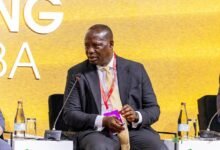
The Executive Director of IMANI Africa, Franklin Cudjoe, has asked the government to fix Ghana’s low domestic revenue mobilisation challenges amid its talks with the International Monetary Fund (IMF) for support.
Franklin Cudjoe said the IMF’s intervention should not deter the government from addressing the fundamental challenges hindering economic growth.
“We cannot be scapegoating the IMF for our economic failures. I think it is about time we fixed weak spending choices. We need to fix our weak government institutions and low revenue mobilisation. The IMF will come and go, but we should be at the commanding height,” he said on Citi FM and Citi TV’s news analysis programme, The Big Issue.
The goverment had refused to seek an IMF bailout despite the massive economic downturn in the last six months, but later decided to swallow its pride and seek support from the Bretton Woods institution.
Officials of the IMF have already met the Finance Minister, Ken Ofori-Atta, and some key officials of the Finance Ministry to kickstart work on the bailout being sought by Ghana.
The meeting saw the IMF examining the government’s fiscal expenditure and projections for the year 2022.
Franklin Cudjoeemphasised the need for the government to be truthful about Ghana’s debt situation.
“The process leading to the agreement must be thorough as the agreement itself. There are issues about governance and transparency [that we need to fix].”
Some civil society organisations have expressed their displeasure at the government’s request for a bail-out from the IMF.
They corroborated the concerns of TUC saying the economic hardship being endured by the people of government will get worse with IMF restrictions.
In a related development, a former Minister of Finance, Seth Terkper, has advised the government to be transparent in its ongoing discussions with the International Monetary Fund (IMF).
Mr Terkper said the government’s openness about Ghana’s debt situation will enable both parties to devise measures that will tackle the fiscal and structural challenges that compelled the country to turn to the IMF for support.
“The IMF has been complaining already about the lack of transparency, so I think if we want to make progress, we need to be very open so we know the depth of the problems.”
This will be the 17th time Ghana is going to the IMF for help.






